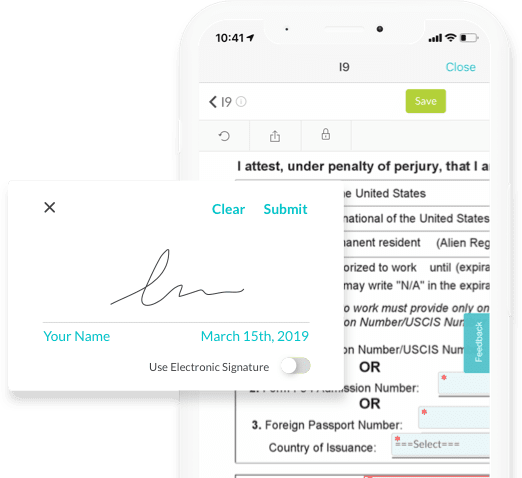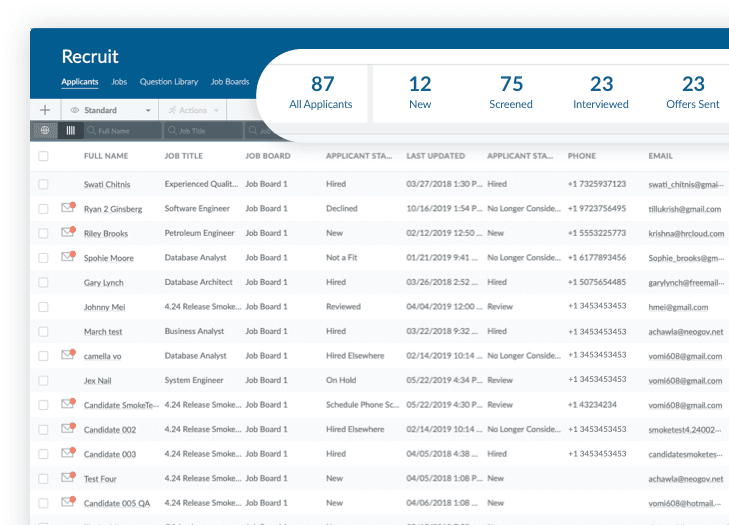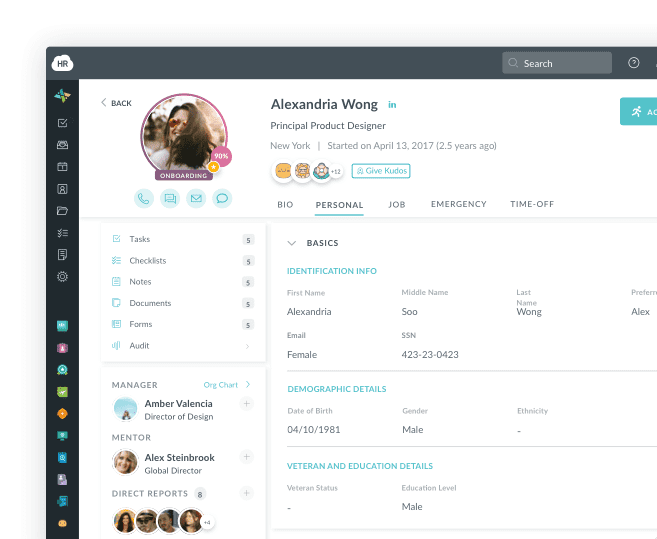The Benefits of Implementing a DEI Strategy in Your Hiring Process

Most of us have heard of diversity, equity, and inclusion. If you haven’t, you’re in a rapidly dwindling minority! DEI strategies can improve the hiring process significantly, both for your organization and for the applicants.
While there has been widespread criticism of so-called “diversity hires” or their associated programs, research has shown that ensuring you have a diverse company culture improves a variety of aspects of your workplace and your hiring process.
As a result, implementing DEI strategies in your hiring process is something that is really quite desirable!
Also, it might be a good idea to take a look at an ATS software.
Want to Improve Your
Company Culture
is right for you.
What is DEI?
DEI stands for Diversity, Equity, and Inclusion. DEI strategies are all about making sure that you are hiring people from a wide range of cultures and backgrounds — essentially, it’s about making sure that you have a diverse workforce.
DEI can involve a variety of different component strategies, from ensuring that your selection process isn’t preferentially admitting (or screening out) a certain group to consistently re-evaluating hiring and promotion criteria to ensure you are not over- or under-representing a particular group.
DEI also incorporates elements of public relations, making sure that you are presenting an inclusive and supportive face that represents your commitment to the ideas behind DEI.
Further, it’s not only about looking at an applicant’s CV or resume impartially, or just about making sure you’re not screening out groups during your application process.
DEI strategies can also include offering remote work positions to those who may be unable to afford the commute (or may be primary caregivers at home), ensuring that you are engaging in outreach programs, and making sure you are consistently informing your employees about promotion opportunities within the company.
The Transformative Link between DE&I and Company Culture
While it may not have been the case in the past, DE&I and company culture are intertwined more than ever before.
A survey from LinkedIn Talent Solutions showed that around 25% of respondents believed that DEI was the most important area to improve company culture.
The way that your company culture impacts people in minority groups and how they work is also something to consider.
Another survey found that Black workers are much more likely to have difficulty balancing work and home commitments due to company culture.
By adopting various DEI strategies, you can ensure that you avoid company culture negatively impacting workers’ personal lives – and so improve your workplace for everyone.

The Benefits of DEI in Your Hiring Process
DEI provides a wide variety of benefits both to the hiring process and to the workplace as a whole.
Enhanced Employee Retention and Reduced Turnover Rates
Nobody likes being in an environment where they feel like the odd one out. Maybe it was lunch at recess in elementary school, or at your first job when you didn’t know what to do – we’ve all had the experience at least once.
Now, imagine that that’s the case every day you come to work.
You’re surrounded by a group of people who don’t think, act, talk, or look like you. You don’t have anything that reminds you of the environment you’re comfortable in, and you’re expected to churn out work and be as productive as possible.
Doesn’t sound particularly fun, right? This is the problem with workplaces that don’t incorporate DEI strategies into their hiring processes.
To make matters worse, company culture can grate on employees if DEI training and strategies are not implemented effectively, leading to higher turnover rates.
It’s very easy for someone in this situation to start looking for a new employer who will value them for their skills and provide more beneficial working conditions and a more inclusive company culture.
Implementing DEI strategies means you will be the company these people come to work for. So, what’s to lose?
Diversity in the Workplace Stimulates Innovation
Imagine that you got a bunch of software engineers in a room and asked them to design an app to help with gardening. They’d be great at the app design part, but maybe not so great at what gardeners actually need.
Similarly, if you gathered a group of gardeners in a room and asked them to design the same app, you’d have something that gardeners are more likely to use — but it likely wouldn’t be implemented as well.
It’s only when these two groups come together that you get a truly great product. The importance of stakeholder input isn’t exactly a new thing, but its correlation to a diverse work environment might be.
The greater the diversity of the work environment, the more likely it is that people will have novel ideas to bring to the table around various projects.
Whether you’re designing furniture or starting the next Uber, people from different cultures will understand different needs that you wouldn’t necessarily consider if you had a design team primarily (or entirely) composed of people with the same background.
Post Jobs, Evaluete Candidates,
and Hire the Best with Our
Applicant Tracking System
Learn More about Recruit
Financially Stronger Performance Linked to Varied and Inclusive Work Teams
While it might not sound obvious, diverse and inclusive work teams tend to perform stronger financially as well.
For example, operating margins were around 10% higher for organizations with diverse management teams compared to companies with below-average management diversity.
Expand and Embrace a Broader and More Diverse Pool of Talented Individuals
Nobody likes realizing that their hiring process or workplace discriminates against a certain group; there are very few other things that will make you feel a bit gross.
The good news is that once you’ve realized what’s going on, fixing the problems will not only make you feel less gross but also open up a brand new hiring population that will increase your talent pool.
Applicants from minority backgrounds are just as qualified (or sometimes, even more qualified) than their compatriots in majority populations.
A lack of DEI techniques in your hiring process unnecessarily excludes this excellent talent pool, making it a lose-lose situation.
Addressing Workplace Burnout through Equity and Inclusion
As we’ve discussed above, minority groups (particularly black people) are much more likely to report that company culture impacts how well they can balance work and home life.
That same study also points out that non-white workers (including black, Hispanic, and other races and ethnicities) are more likely to report exhaustion after leaving work.
Burnout comes from many things, but a key cause is repeated exhaustion at work.
If you aren’t facilitating an inclusive environment, workers of minority races and ethnicities will consistently have a harder time at work — leading to both an inhospitable environment for them and a drop in productivity for your organization.
Take Advantage of E-Forms, Time-Off Tracking, and Other Powerful Features to Help Drive Your Bussines
Learn More about HRMS
Establishes a Competitive Edge for Businesses
All of the above combine to present a competitive edge for businesses.
Improved financial performance, better access to new talent, better employee retention, and improved innovation all mean that you’re getting a better share of the market than your comparatively less diverse competitors.
DEI Safeguards and Preserves Company Culture
While many people are worried about the effect of hiring from a wider pool on company culture, diversity actually tends to preserve company culture.
When implementing DEI strategies, you don’t need to revamp your whole organization’s identity. Instead, you adapt it slightly to make everyone feel at home.
Now, you have a wide variety of different cultural groups who are able to engage with and spread your company culture, making it much more resilient and widely known.
Inclusive Environment Cultivates a Sense of Belonging Among Employees
If you don’t have any DEI strategies in place, you might end up with some representation of multiple cultures in your workplace. However, most will be a token contribution to the overall workplace makeup.
On the other hand, a diverse environment means that new hires will have people who they connect with more strongly — making them more enthusiastic about engaging with the workplace in general.
Additionally, the large variety of cultures and backgrounds present in the workplace will make everyone feel at home.
This is because people will see that even though they may be from a different background from others, it’s not something that the organization discourages.
Business Decision-Making Enhanced Through Inclusive Practices
The inclusion aspect of DEI is very important! Even if you hire from a diverse range of backgrounds, you won’t see any benefits unless you include them in decision-making processes.
Having people from multiple backgrounds at the decision-making table means that some problems that may have been overlooked will instead be spotted, as different perspectives will combine to reveal hidden (but valuable) details.
The Bottom Line
DEI practices aren’t just a buzzword for the modern age — they’ve been shown to have a marked impact on everything from financial performance to reducing employee burnout rates.
Plus, they’re also not in opposition to your company’s culture; if anything, you’ll strengthen and support your existing workplace identity by ensuring everyone feels more comfortable.
So, why wouldn’t you implement them in your hiring process? You’ve got nothing to lose!
Author Bio:
Andrei Kurtuy is the CCO & Co-Founder at Novorésumé, one of the top CV builders online. He loves to write about job hunting and to help job seekers set themselves apart in their search.
Keep Reading
Retention Reset: How to Keep Your Best Talent in 2025
More employees are walking away from their jobs in 2025 not just for better pay, but for
The Most Common Hiring Mistakes in the Healthcare Industry
The hiring process can be tedious in the healthcare industry, and it may be tempting to

